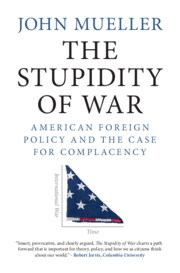Book contents
- The Stupidity of War
- The Stupidity of War
- Copyright page
- Dedication
- Contents
- Figures
- Acknowledgements
- Additional material
- Prologue The Rise of War Aversion and the Decline of International War
- Part I Assessing the Threat Record
- Part II Evaluating Present Threats
- Afterword Aversion to International War as an Explanatory Variable
- Appendix: A Sardonic Litany
- Notes
- References
- Index
Afterword - Aversion to International War as an Explanatory Variable
Published online by Cambridge University Press: 01 March 2021
- The Stupidity of War
- The Stupidity of War
- Copyright page
- Dedication
- Contents
- Figures
- Acknowledgements
- Additional material
- Prologue The Rise of War Aversion and the Decline of International War
- Part I Assessing the Threat Record
- Part II Evaluating Present Threats
- Afterword Aversion to International War as an Explanatory Variable
- Appendix: A Sardonic Litany
- Notes
- References
- Index
Summary
Although the American military record since 1945 has been pretty unimpressive, some argue, first, that the United States, aided perhaps by the attention-arresting fear of nuclear weapons, was necessary to provide worldwide security and thus to order the world, and, second, that the United States was vital in constructing international institutions, conventions, and norms, advancing economic development, and expanding democracy–processes, it is contended, that in various ways have ordered the world and crucially helped to establish and maintain international peace. However, it seems more plausible that the positive developments would mostly have happened even without much American security participation, and that, for the most part, world order has developed not from the machinations of the reigning superpower but from the aversion to international war embraced after World War II especially by developed countries. In fact, if the nearly 200 states that inhabit the world order come substantially to abandon the idea that international war is a sensible method for solving problems among themselves, the notion that they live in “anarchy” becomes misleading and could encourage undesirable policy developments. “World order” is based on a general aversion to international war and does not depend on the United States.
Keywords
- Type
- Chapter
- Information
- The Stupidity of WarAmerican Foreign Policy and the Case for Complacency, pp. 207 - 223Publisher: Cambridge University PressPrint publication year: 2021

